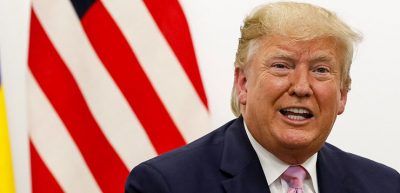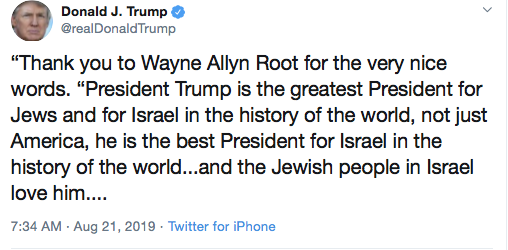The Unflattering Veneer of Trump’s Self-proclaimed Greatness

“It is up to us whether we will lift the world to new heights or let it fall into a valley of disrepair.” — US president Donald Trump addressing the UN General Assembly on 19 September 2017
The U.S. Economy is the envy of the world, as Europe and Asia slide ever toward recession. — Trump tweet from 19 September 2019
To be supreme is, by definition, to be the greatest, to be ultimate, to reach sublimity.
However, to believe yourself to be supreme or the greatest is to belie greatness. [1] Greatness, generally, presupposes recognition; ergo, there is no need to mention, and definitely not flaunt, such a status. To do so would be ostentation and arrogance.
Therefore, talk of American greatness, white supremacism, Jewish supremacism, or any kind of self or group-affiliated supremacism is nonsense.
The very act of claiming supreme or chosen stature is to vitiate such a claim. First, braggadocio invites repugnance. Humility is the revered trait. Second, the act of claiming greatness nullifies the claim. Third, it calls for a critical examination of what underlies such the claim.
Donald Trump, who attracts the support of white supremacists, ran on making America great again, ostensibly indicating that America was not great during his electoral campaigning. [2] After all, can a state established through genocide, land theft, and enslaving other human beings be great; especially when the theft continues without apology, atonement, and without reparations made to the impacted parties?
What pretense does America have to greatness subsequent to its foundation on territory violently stolen from Indigenous nations?
The US developed a mighty military capability. Since WWII, in flagrant abnegation of international law, [3] it has wreaked war on several smaller nations, devastating many of them for generations, thus incurring the label of a rogue state. [4] Does a great state not adhere to international law and seek to uphold it? Is resorting to military might not an admission of inability to lead or influence other states? [5]
So it is no surprise that Trump threatens to use US military might to destroy nations that do not obey US dictate.
“The United States has great strength and patience, but if it is forced to defend itself or its allies, we will have no choice but to totally destroy North Korea.” — Trump to the UN Genera Assembly on 17 September 2017
“If I wanted to win that war, Afghanistan would be wiped off the face of the earth. It would be gone in 10 days.” — Trump on 22 July 2019
“I am fully prepared to swiftly destroy Turkey’s economy…” – Trump on 14 October 2019 [italics added]
US dictate or is it Trump’s dictate? Because in the past year, he talks in the first person, as if it is him, personally, that will be annihilating other nations.
Whether it be personal bluster or commanding a powerful military, resorting to violence is a violation of the United Nations Charter, and it certainly does not set the standard of the behavior desired from the community of nations.
Trump has dubbed himself the “King of Israel” and “the second coming of God.” It, therefore, seems only natural that he would align himself with another scofflaw state. To drive home his status with Israel, he tweeted of his greatness;
Israel is a state erected on historical Palestine with the acquiescence of the UN. Israel calls itself the Jewish state. It is guilty of a genocide which continues in slow motion. [6] It is expansionist and continues to annex Arab territory. It does not define its borders; although in the Oded Yinon Plan, Zionist Jews have proposed a state spread far beyond Israel’s borders as currently recognized by the international community.
Israel is criticized as an apartheid state. It practices open racism that only a fool or illusional person would fail to recognize. However, few racists have the fortitude to admit to their racism. [7]
Activist author Gray Zatzman argues “The Notion of the ‘Jewish State’ as an ‘Apartheid Regime’ is a Liberal-Zionist One.” He writes:
The cause of Palestine consists of the restoration of the national rights of the Palestinian people and enabling the Palestinians to exercise their right of self-determination in their own territory…. Enabling the Palestinians to exercise their right of self-determination in their own territory means implementing the Palestinians’ right to return to their lands and to be restored in the property/properties that were taken from them in the course of acts of conquest by the Zionist movement, and in clear cut violation of international law, during 1947-48 and again in June 1967.
… the cause of Palestine entails eliminating the Zionist junta’s so-called “Jewish state” of European-American colonialist privilege and restoring to the Palestinians what the Zionists stole.
Claims of supremacism are elitist. Supremacism and elitism go hand-in-hand with capitalism. It is the capitalists who place themselves above the working classes whose labor they exploit. Billionaires own and control mass media wherein they can preen and grandiosely display their wealth. As justification for the wealth disparity, they conjure the myth that they reached the pinnacle of monetary accumulation through smarts and hard work, [8] whereas they denigrate the poor as being lazy. But they may take pity on the poor masses and set up foundations, often bearing their name, and claim to be philanthropists.
Supremacism is anti-egalitarian. The supremacist posits that he is superior, hence others are posited, by linguistic logic, to be inferior. Capitalism, racism, Zionism, exceptionalism, and nationalism buy into this louche mindset.
The masses have a choice: a) to acquiesce to the elitists and accept subaltern status, b) attempt change through participation in the charade of a democracy bought, paid for, and rigged by the elitists, or c) they can withdraw from the system and strike out on their own. Better yet, d) organize with the masses and through sustained commitment and solidarity bring about a revolution. Abolish the fetid iniquity of capitalism and in its place erect an egalitarian system for the benefit of all the people. [9]
*
Note to readers: please click the share buttons above or below. Forward this article to your email lists. Crosspost on your blog site, internet forums. etc.
Kim Petersen is a former co-editor of the Dissident Voice newsletter. He can be reached at: [email protected]. Twitter: @kimpetersen.
Notes
- I speak of supremacism/greatness as a stable unvarying attribute by virtue of which group one aligns with and not to epochal moments of personal achievement. E.g., Muhammad Ali was one of the greatest boxers, but he pointed immodestly to his greatness in the ring during the peak of his career and not his group affiliation.
- And just what does it signify about the greatness of a nation that the vote-casting citizenry elected Donald Trump as their president?
- Read Nils Andersson, Daniel Iagolnitzer, and Diana G. (eds), International Justice and Impunity: The Case of the United States, (Clarity Press, 2008). Review.
- See William Blum, Rogue State (Common Courage Press, 2000).
- Stalwart US-ally Canada being referred to as “the peaceable kingdom”; however, it shares the same odious history for the most part with the USA. See Richard Sanders, Fictive Canada, Issue #69, Press for Conversion! (Fall 2017).
- For an informative affordable overview of the crimes of the Jewish State see Tony Seed and Gary Zatzman (eds), Dossier on Palestine, (Shunpiking, 2002).
- With my colleague B.J. Sabri, we wrote a 12-part series where we concluded, “Zionism is irrefutably racist.” See Kim Petersen and BJ Sabri, “Defining Israeli Zionist Racism,” Dissident Voice, Parts 1, 2, 3, 4, 5, 6, 7, 8, 9, 10, 11, and 12.
- Read Brian Miller and Mike Lapham’s The Self-Made Myth: And the Truth about How Government Helps Individuals and Businesses Succeed, (2012).
- How might such an egalitarian world look? Michael Albert discusses how an anarchist economy might operate in Parecon: Life After Capitalism (Verso, 2013). Review. Or one might even consider the emergence of a Star Trek economy. See Manu Saadia, Trekonomics: The Economics of Star Trek (Piper Text Publishing, 2016). Review.
Featured image is from Palácio do Planalto, Flick



